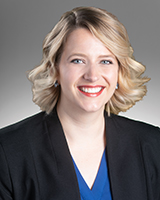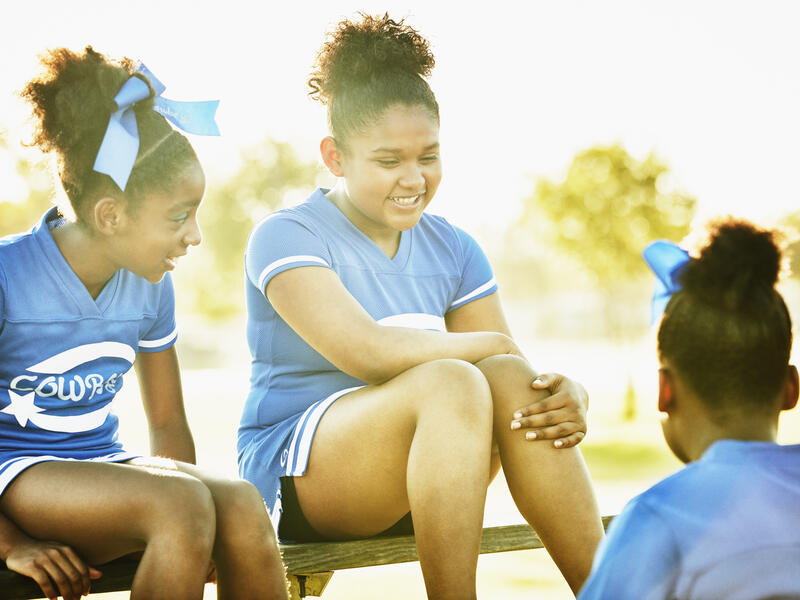As a Sanford Health neuropsychologist, Dr. Josefine Combs accompanies concussion patients on the journey to recovery.
For many athletes who suffer a concussion, that trip back to wellness starts out with questions: What just happened to me? Why do I feel the way I feel? What do I have to do to get back to full speed?
It is Dr. Combs’ role, in collaboration with the rest of the Sanford Health concussion team of caregivers, to chart out a clear path to recovery in concert with others. It’s not just about athletes, either. She extends her expertise to people who have been in car accidents, slipped and fallen, or hurt themselves at work.
“I like to see my patients within that first week after an injury,” Dr. Combs said. “That way I can dive in right away and provide what I call a ‘psycho-education.’ I think of it as being the patient’s quarterback. We come up with a plan that we’ll execute as a team. The more communication and the more teamwork, the faster the recovery and the better the outcome is going to be.”
The Sanford Orthopedics and Sports Medicine team includes physicians, physical therapists and occupational therapists in addition to neuropsychologists.
Getting a baseline test
Sanford Health concussion care and return-to-play guidelines are based on the latest research. That care includes certified ImPACT (Immediate Post-Concussion Assessment and Cognitive Test) consultants and baseline and post-injury testing.

Pre-injury baseline testing can be a valuable tool in the diagnosis and treatment of concussions and is easily accessible at Sanford by calling (605) 325-2663 to set up an appointment. It’s a quick assessment that provides personalized information that then can help determine when it’s OK to return to action after a concussion.
Combs advises that adults should receive a baseline test once, while kids 10 and up should be tested every one or two years. The test takes 30 to 40 minutes and costs $40, which you can pay in cash at the time of the testing.
The testing involves four assessments:
- King-Devick test
- Balance assessment
- Vestibular/ocular-motor screening
- ImPACT testing
Those participating receive a copy of the results. For Sanford patients, the results are also entered into your chart and available to your providers. After being diagnosed, patients can schedule an appointment to be re-evaluated and begin the recovery process.
All concussions are different
The existence of pre- and post-injury testing demonstrates that diagnosis and treatment of concussions have come a long way in the last 20 years. Neuropsychology is a big part of that climb.
That role includes educating patients as well as their parents. In many instances, those affected start out with a view of their injury that is out-of-date. Dr. Combs then explains how things are going to work.
“Concussions are not one-size-fits-all,” she said. “There is a great variability. If I had a concussion and my teammate also had a concussion those two injuries might be very different. That’s why taking an assessment is so important.”
Related: Sports psychologist helps athletes build healthy attitudes
With an assessment comes explanation. Dr. Combs will explain the injury and give a patient insight into why they’re feeling the way they are.
“Concussions can be a very weird thing to go through,” she said. “It’s quite different from any other sports injury or any injury in general because our brain is involved in everything we do: How we function, our emotions, movements — everything. So when it’s not functioning it can affect many areas of our life.”
Helping patients through that initial unfamiliarity is a valuable part of being a neuropsychologist, particularly as it applies to student-athletes.
“A lot are very dedicated and invested in what they’re doing,” Dr. Combs said. “So they’re very upset when we have to remove them temporarily from their sport, or reduce their engagement, while they’re healing. At the clinic, those conversations go a lot better if they understand why we’re doing what we’re doing. They need to know these are preventive measures, not a punishment.”
Education the key
It is at this time Dr. Combs can tell them the way they’re feeling is not going to last. They are going to get better and that recovery process will most likely involve more than just taking some time off from activities. They will be able to take an active role in speeding up their recovery.
“How we regard physical activity with a concussion has changed dramatically over the last decade,” Dr. Combs said. “It’s not just about laying down and resting until you don’t feel the symptoms anymore. There are different types of concussions, and with some of them you will not get better until there is controlled, non-contact physical activity. You need to be exposed to physical activity — it’s actually part of the functional rehab.”
Dr. Combs is a former college volleyball player who was also a swimmer and a soccer player growing up. That sports background led to an interest in sports psychology, which in turn led to offering care to athletes who suffer concussions.
Prior to moving on to Sanford, she was doing post-doctorate work at the University of Pittsburgh, which has one of the leading concussion clinics in the country. If there was any doubt she was on the right career path, that ended it. She’s passionate about helping athletes get back to doing what they like to do.
“I don’t think there’s a sport I haven’t dealt with. Everything from the traditional sports like basketball and football to tennis, auto racing and golf — to more exotic sports like Brazilian jiu-jitsu,” Dr. Combs said. “I’ve also seen athletes on every level, from middle school to pro sports and everything in between. I’ve always been intrigued by the psychological complexity of athletes and how they’re impacted by different things.”
Read more
- High school wrestler returns to the mat after concussion
- Sanford sports scientists studying ways to make MMA safer
- Sports physical can help parents spot health issues
…
Posted In Back to School, Basketball, Brain & Spine, Children's, Healthy Living, Neurology, Sports Medicine
